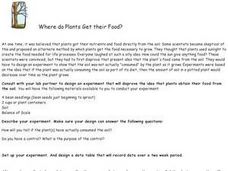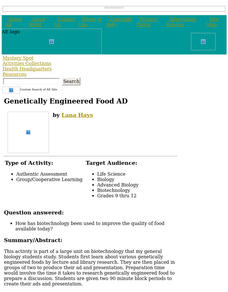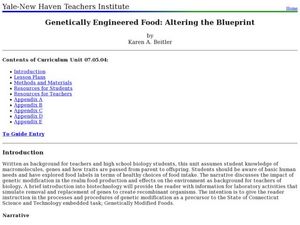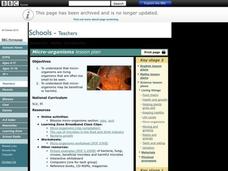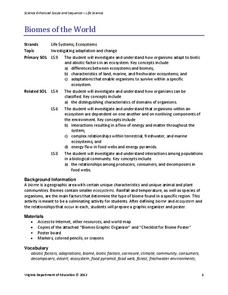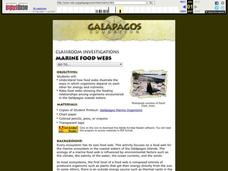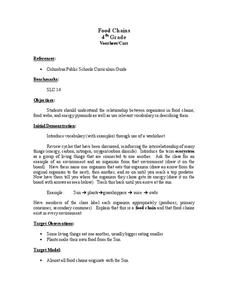Curated OER
Where Do Plants Get Their Food?
Plants need food to survive, just like any other living organism. Young biologists analyze an experiment performed in 1610 by Jan van Helmont to determine if plant nutrition is obtained through the soil. First, lab groups work together...
Curated OER
Food Webs
Students investigate the concept of an ecosystem and how they are interconnected according to a hierarchy. Students are exposed to the "Lion King" as an example of a food chain and this is very relevant. They answer several key...
Curated OER
Food Chains and Food Webs
Students discuss the characteristics of producers, consumers and decomposers. Using a flow chart, they construct a food chain to visually show how organisms with different energy sources depend upon one another. Students explore a...
Curated OER
The Food Pyramid
Fourth graders plan a variety of nutritional meals using the USDA's Food Guide Pyramid as a reference and analyze food labels to plan their meals. They examine and discuss the Food Pyramid, and create dichotomous keys separating food...
Curated OER
Organisms and Their Environment
Students observe elements of a local ecosystem and gain an understanding of what elements make up an ecosystem. For this ecosystem lesson students create a class food web that shows the interactions among the elements of the...
Curated OER
Food Webs and Chains
Fifth graders examine how simple food chains and food webs function. They examine an illustrated food chain/food web and identify the producers and consumers. Students then sequence pictures of animals into a food web, and create their...
Curated OER
Organ System Interactions
Eighth graders who have studied all of the organ systems now discover how they all are related and work together in the human body. They discuss a variety of situations in which more than one system plays a part. They identify the...
Curated OER
Fun With Food Chains
Students explore our ecosystem by researching animal eating habits. In this food chain lesson, students identify the links between predator and prey and the energy that passes between organisms based on what their diet consists of....
Curated OER
Biotechnology, GMOs and Food
Twelfth graders explore controversy around genetically modified foods, identify source of controversy, and role play town hall meeting on genetically modified foods, to examine viewpoints and arguments for and against genetic modification.
Curated OER
Genetically Engineered Food AD
Students examine various genetically engineered foods by lecture and library research. They are then placed in groups of two to produce their ad and make a presentation on a food they have developed.
Curated OER
Graphing the Annual Food Drive
Learners graph the number of items contributed to the food drive. They compare daily results to other days or to an overall goal and answer questions based on the graph.
Curated OER
The Food Chain Game - A Lesson in Ecosystems
Students are divided into three groups, herbivores, omnivores, and carnivores which receive a certain number of lives. Once in their ecosystem (outside or the gym), the carnivores chase and eat either the herbivores or omnivores, the...
Curated OER
Genetically Engineered Food: Altering the Blueprint
Students explore the genetic engineering of food. In this health lesson plan students explain how DNA technology can be used to produce food.
Curated OER
Major Organic Acids in Fruits
Students investigate the organic acids present in a variety of juices. In this organic acids lesson plan, students read about the effects of organic acids in juices. They use paper chromatography to separate out the acids present in a...
Curated OER
Micro-Organisms
Students investigate microscopic life by viewing video clips. In this organisms activity, students view photographs and video clips on the internet of micro-organisms and discuss the harms and benefits of the creatures. ...
Polar Trec
Arctic Smorgasbord!
Two blooms of phytoplankton, instead of just one, now occur in the Arctic due to declining sea ice, which will have widespread effects on the marine life and climate. In small groups, participants build an Arctic food web with given...
Virginia Department of Education
Biomes of the World
Incorporate knowledge about biomes and ecosystems in multiple ways while encouraging creativity. Emerging ecologists collaborate and perform research to complete a graphic organizer about various biomes of the world. They conclude the...
August House
Go to Sleep, Gecko
Use this multidisciplinary lesson to delve into these subjects: English language arts, math, science, drama, and character education. After reading, discussing, and making interpretations about Go To Sleep, Gecko!: A Balinese...
NOAA
Deep-Sea Ecosystems – Life is Weird!
A pool of brine in the deep sea can be up to four times as salty as the surrounding sea water. The deep sea ecosystem relies on chemosynthesis and the organisms that live there are often strange to us. The lesson focuses on researching...
NOAA
Animals of the Fire Ice
When the sun's rays can't reach the producers in a food web, where does all the energy come from? Extreme environments call for extreme food sources. Young scientists investigate creatures that appear to get their energy from methane...
Curated OER
My Colorful Food Chain
Students explore biology by participating in a dietary habit activity. In this food chain lesson, students discuss their own diets and the animals we feed upon daily. Students create a poster demonstrating the animals that we feed upon...
Curated OER
Food Chains & Food Webs
Young scholars examine the concepts of food chains and food webs. They trace back common food chains found in nature, demonstrate the interdependence of organisms through a food webbing activity, and analyze the flow of the food chain of...
Curated OER
Marine Food Webs
Students examine how food webs illustrate the ways in which organisms depend on each other for energy and nutrients, and make food webs showing the feeding relationships among organisms encountered in the Gal??pagos coastal waters.
Curated OER
Food Chains
Fourth graders investigate food chains. They review cycles and discuss ecosystems. They select an environment and create a food chain in small groups. They write their food chain and label it for the class to evaluate. They create...
Other popular searches
- Con Pair Organic Foods
- Organic Foods Taste
- Non Organic Foods
- Com Pair Organic Foods
- California Organic Foods
- Compair Organic Foods
- Conpair Organic Foods
- Organic Foods Lesson Plan
